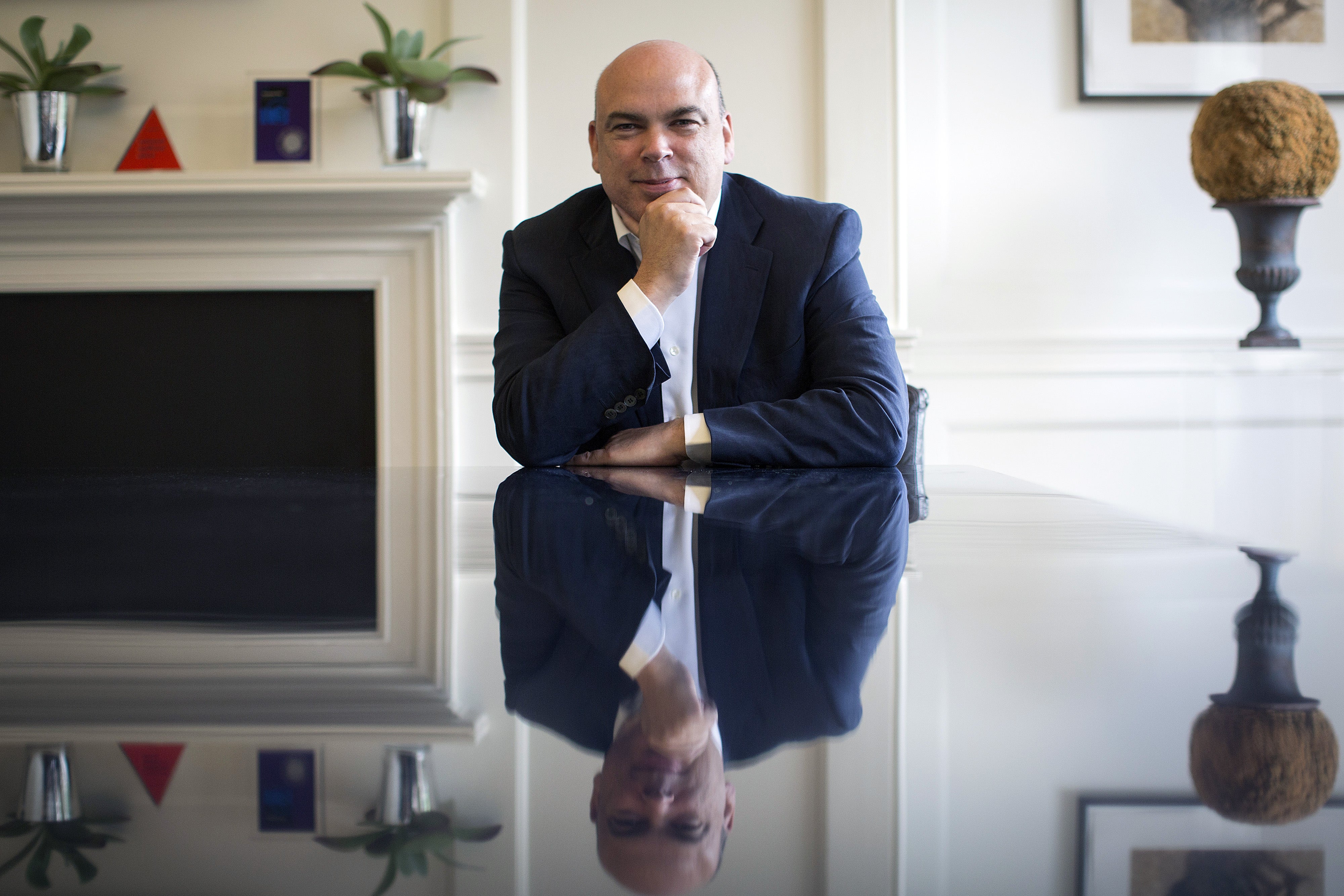I knew Mike Lynch and his next idea was to get us to believe the unbelievable
The entrepreneur who died in a freak yachting disaster has been dubbed the British Bill Gates, but Jonathan Margolis, who knew him well, says he was a fascinating man obsessed with the science of probability and his next project was to make us believe the unbelievable

Just under 10 weeks ago, 59-year-old Mike Lynch was on trial in San Francisco on 17 charges of fraud. He was almost guaranteed to receive a 25-year sentence.
He was terrified that he would die in a US prison, not because he was guilty – he had spent £30m on legal fees arguing his innocence – but because it’s almost unheard of in the US to win a case against the US Justice Department. His chances of winning were put at 0.5 per cent. However, after 13 years of putting together detailed evidence to support his plea, he was acquitted and it felt like a miracle.
Once back in the UK, Lynch set about celebrating what he called his second life. Through tears, he told one interviewer how even the traffic in London seemed magical. “I’m just thinking this is the most beautiful thing I have ever seen,” he said.
This month, the tech tycoon took his family, friends and lawyers for further celebrations on a Mediterranean cruise aboard his luxury sailboat. It sank in a freak violent squall in the small hours of Monday. His body was discovered on Wednesday, alongside five others recovered from the sunken Bayesian superyacht with his 18-year-old daughter Hannah still reported missing.
The chance of such a yacht being knocked flat by a weather event while anchored was minuscule because it had simply never happened before. Sailing expert Stewart Campbell, editor-in-chief of Boat International, said on Newsnight: “I’ve been speaking to a lot [of people in] the industry today and they are as shocked as me – and just in utter disbelief that this could happen.”
As if beating infinitesimal odds twice in a few weeks wasn’t freakish enough, it has since emerged that Lynch’s co-defendant in the US trial, his company’s former vice-president of finance Stephen Chamberlain, was killed by a car on Saturday while out running in Cambridgeshire.
The chance of both defendants dying within weeks of the trial, are beyond absurd. The combination of all three events is beyond crazy. Although it is all bound to be a cluster of coincidences, both lucky and tragic, there will doubtless be X-Files-like conspiracy theories about the affair for years to come.
The ultimate irony, however, is that the Essex-born academic, technology business innovator and tycoon, prime ministerial adviser and general member of the great and good was also one of the world’s leading authorities on probability theory.
Were Lynch’s story not true, anyone who went to Netflix with a dramatisation of it would probably be shown the door for being ludicrously improbable.
Specifically, Lynch was a proponent and teacher at his alma mater Cambridge University of Bayesian mathematics. Indeed, he named his boat after the theory of Thomas Bayes, an 18th-century statistician and Presbyterian minister in Tunbridge Wells.
Bayesian maths embraces the idea that predictions of unusual outcomes – freak weather events for one – can’t be made accurately using a conventional fixed framework of information. Instead, they have to be constantly updated with fresh data on how a situation develops. Bayesian maths is also the basis of the current boom in artificial intelligence, in which Mike Lynch was a pioneer.

Dubbed the British Bill Gates, Lynch sounds to many like a major-league nerd (possibly lucky not to be serving some serious prison time). However, I can vouch for a very different Lynch. I’d been in touch with him since 2016 and found him not just almost alarmingly straightforward and honest, but very amusing, extraordinarily erudite in everything from technology to classical cultures, and unexpectedly unorthodox in his views on science.
This is how I came to be in his Pall Mall office eight years ago for a sparkling one-to-one meeting-cum-tutorial on the subject of not technology, not his already mounting legal problems but… dogs.
Mike Lynch had contacted me about a column I wrote for many years in the Financial Times. He knew that I was interested in fringe science – I once wrote a book on Uri Geller – and that we’d been at the same Essex school but hadn’t known each other at the time. Lynch therefore decided that I was the person to talk to about helping him set up a research project into the sixth sense of dogs.
It was a subject that fascinated him. Lynch explained that he was convinced dogs have a hitherto unexplained sixth sense – that they really do know things without conventional sensual input.
For example, they seem to know if you’re on your way home, even if you’re miles away. “I’ve done this informal experiment many times,” he told me. “I’ll get on a train in London for our house in Suffolk and at that exact second, they will get excited. My wife and I have ruled out as many possible clues as we can. She’ll note the moment they start barking and it will match up with me stepping onto the train.”

The problem was, he went on to explain, that the experimental work that had been done in this area was flawed. For his next big project, he wanted to fund some proper, rigorous, incontestable research.
“I’m not a parapsychologist or a paranormalist,” he told me. “I don’t believe in auras or energies or anything weird. I’m firmly entrenched in science, and I know this is controversial, but there’s an effect out there that needs explaining.”
As a first step, he wanted me to write a column inviting people to describe their experiences with dogs’ sixth sense, and then help him launch a dedicated website for them to post their accounts. “That way we build a database of supposedly psychic dogs to work with.”
We discussed possible names for the website, and how we’d get together to discuss the next step. He was about to go off with David Cameron on a trade mission, I was living in New York at the time, so diaries needed coordinating.
He wasn’t what I had expected, but I found him fascinating, especially as he rattled through his theories further for nearly 90 minutes. He was an inspiring teacher with a big brain and was patient when I lagged behind, or got the wrong end of the stick.
“Dogs are incredibly good at reading people’s emotions,” he said. “The key thing is that dogs are unusual among creatures in that they have mirror neurons, which are very important. These are the neurons in the brain that put you in someone else’s shoes. If I hit my hand with a hammer, you’ll wince. It’s the basis of empathy.
Were Lynch’s story not true, anyone who went to Netflix with a dramatisation of it would probably be shown the door for being ludicrously improbable
“This makes it possible for children around two and a half to learn to lie. Deceit is fascinating because to be deceitful, you have to realise that not everyone has the same information you have. So it’s a major step and a highly intelligent function. Dogs run a model in their mind of what it’s like to be you, or another dog. This is how they become pack animals.”
This, he admitted, was all traditional science. The big question, he wanted to know the answer to, was whether there was something beyond that and, a sort of realm that you can’t explain. “You have to have a good understanding above all of probability – the probability that this or that effect is explicable using known science.
“This is why it’s about time that the experiment was redone properly, so we can find out whether there are dogs that can actually produce a statistically meaningful outcome.”
Being a world authority in mathematical theory, Lynch was reassuring that he was “totally a believer in the scientific method”, but he wanted me to bear in mind that the mammalian brain is the most complex item in the known universe too.
“So the idea that we would understand everything about it sounds arrogant,” he insisted. “I want sceptics to be all over the study even though they might not want to believe it.”
He said this way he could show – or not – that dogs are “Bayesian calculators”. Bayesian logic is kind of magical thinking in a way because it’s so much more subtle and complex than classical logic. “What dogs do in their Bayesian way is use intuition – see data in a different way. But this is not magic, it’s science and it’s going to lead a few years from now to astonishing developments in AI.”
This leap to AI eight years ago from the dry theories of a long-dead clergyman wasn’t surprising. Lynch had the type of brain that was always ahead of its time.

Regarded by many in both academia and business as a tech genius, it’s why in 2011 his technology company, Autonomy, sold for $11.7bn to the fading computer giant HP. It was HP who seem to have suffered buyer’s regret later and started blaming Lynch and his team – incorrectly – for fiddling the books.
For a hard-headed academic his view of intuition made sense in terms of data processing and how we predict things happening. He was adamant that “hunches, gut feeling, intuition” were all sophisticated measures by which decisions are taken, “not boring spreadsheets. This is why big companies make such bad decisions. The danger of analysis drives me nuts but I’ve had to learn this.”
He recounted a story from the past when a “posh dreamer” came to him with a great idea to download music over the internet. Lynch said he spent a long time explaining to him why his vision wouldn’t work. That it would take four days to download a single over the internet and the disc to store it on would cost the same as the average house.
Reflecting on his response, he said: “Of course, what I should have done is said all of that and then gone away and plotted the cost of disc drives and realised he could be on to something. But the over-analysis stopped it happening and I missed out.”
Mike Lynch’s dog project never happened. My interview with him never ran thanks to the question mark over him with the, as then, unsettled court case.
“That’s really sad,” he emailed me after I told him. “But thanks for trying.” He seemed truly upset. We stayed in touch throughout the trial, and were still discussing the Ultimate Dogs Experiment while he was in San Francisco in the run-up to the trial and the court case itself. As the judge proved, I wasn’t the only person to find Lynch convincing and exuding both character and integrity.
I discussed the whole, heart-rending story yesterday with a medical consultant friend from school who had been following his travails. We agreed that this latest tragic twist in his incredible story, feels as improbable as it does just desperately sad.
Bayesian maths is used extensively in forecasting probable weather, so what are the odds against a boat called Bayesian being capsized by a tornado/waterspout in the Mediterranean?
“Smart arse question, sorry,” my friend wrote back, “But with all the money in the world, why does an expert on predicting natural events sleep with friends and family on a boat when the weather is so awful?”
Unfortunately, we will probably never know.





Join our commenting forum
Join thought-provoking conversations, follow other Independent readers and see their replies
Comments